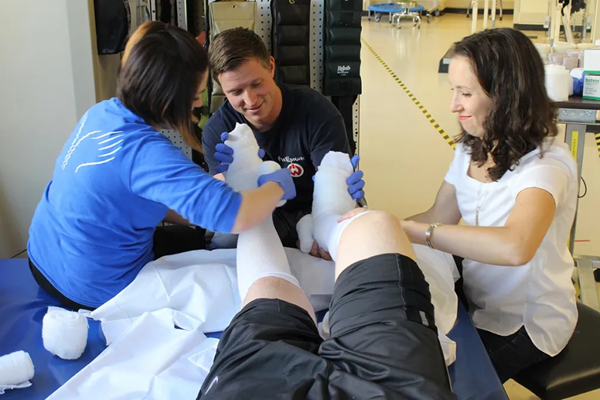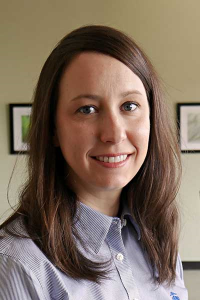
OTR Creates Innovative Lymphedema Program to Aid Patients With Spinal Cord Injury in Recovery and Rehabilitation Efforts
Rebecca Hammad, an OTR and certified lymphedema therapist, started a lymphedema program at Shepherd Center in Atlanta, GA.

Rebecca Hammad, MHS, OTR/L, CLT
Therapy Manager, Spinal Cord Injury Program, Shepherd Center
Location: Georgia
Certified in 2006
The Challenge
Although lymphedema is traditionally thought of in the context of cancer, it also presents serious problems for many patients with spinal cord injuries. Patients with spinal cord injuries commonly have weakened muscles that are unable to act as a pumping mechanism to move fluid throughout the body. An unhealthy build-up of excess fluid beneath the skin can lead to other problems, including chronic swelling and stiffness, clots, and infection, all of which can impede rehabilitation and impact the patient’s ability to complete their daily routines.
The OT Innovation
Rebecca Hammad, an OTR and certified lymphedema therapist, started a lymphedema program at Shepherd Center in Atlanta, GA, to offer complete decongestive therapy (CDT) interventions to individuals experiencing acute and chronic edema after injury or illness. She used her training to modify the traditional approach to CDT to manage swelling after paralysis, reducing the risk of applying compression to a limb with absent sensation.
Rebecca’s lymphedema program involves all four components of CDT, with specific modifications to the compression techniques.
- Skin care: Therapists focus on keeping the skin intact, which guards against infection.
- Manual lymphatic drainage: Therapists apply a light-touch technique that is performed at the surface level of the skin to help stimulate the lymphatic system and promote the flow of fluid.
- Compression therapy: A multi-layered bandaging technique is used to reduce limb volume and reverse trophic changes. Modifications to the number of layers, types of padding, and pattern of wrapping are unique to Rebecca’s approach.
- Specialized exercise program: Exercises are incorporated into what patients are already doing in therapy to promote lymphatic motility.

Image courtesy of Shepherd Center
Therapists track patients’ progress by measuring the circumference of the leg at specific points and estimating the volume of fluid. With these techniques in place, it is not unusual for all fluid to be removed, visually reducing the size of the limb by 25%.
As part of the lymphedema program, Rebecca developed a partnership with the Piedmont Compression Group, which allowed Shepherd Center to use Piedmont’s compression fitter to obtain better-fitting or custom products for their patients. Rebecca’s valuable insights into lymphedema treatment also led to custom changes to garments that increase the safety for individuals who use wheelchairs as their main mobility device.
Innovation Leads to Education, Advocacy, and Action
Rebecca developed and hosted several lymphedema courses to train the therapists at Shepherd Center and other therapists from the community about lymphedema treatments. This created a tremendous expansion of the lymphedema program, allowing Rebecca and her team to treat more than 700 patients since 2015. An effective practitioner, educator, and innovator in the field, Rebecca has presented her work to various organizations, including the American Congress of Rehabilitation Medicine, and has published research in the peer-reviewed journal, Spinal Cord, from the International Spinal Cord Society. She has also contributed to lymphedema advocacy efforts through her participation in Lymphedema Lobby Days for passage of the Lymphedema Treatment Act and her involvement as a board member of the Lighthouse Lymphedema Network.
“[Rebecca] used her training as a Certified Lymphedema Therapist to modify the traditional approach to Complete Decongestive Therapy to manage swelling after paralysis, while reducing the risk of applying compression to a limb with absent sensation. This innovative technique allowed her to develop the lymphedema program at Shepherd Center… She has been a strong voice in advocacy for her patients, played a part in legislative change, and presents and publishes her work with other professionals.”
Paula Ackerman, MS, OTR/L
Program Manager, Post-Acute Spinal Cord Injury Program
Shepherd Center